Emerging Disruptors in Agricultural Technologies
Delivered – Virtually
April 24, 2025
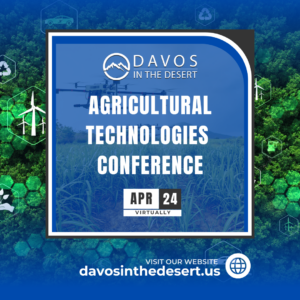 Welcome to Davos in the Desert’s Agricultural Technology Conference. Hear CEOs of agricultural technology companies tell us about how their businesses are seizing opportunities in this enormous industry. Listen to industry experts discuss groundbreaking agricultural technology research. Join us virtually on April 24, 2025, and gain unparalleled insight into breaking developments in agricultural technology.
Welcome to Davos in the Desert’s Agricultural Technology Conference. Hear CEOs of agricultural technology companies tell us about how their businesses are seizing opportunities in this enormous industry. Listen to industry experts discuss groundbreaking agricultural technology research. Join us virtually on April 24, 2025, and gain unparalleled insight into breaking developments in agricultural technology.
The Agricultural Technology Market clocked in at approximately $30 billion in 2024 and could reach nearly $80 billion by 2030, demonstrating a CAGR of 16.5%. North America accounts for roughly 63% of this market.
Agricultural technology can be found in the following settings:
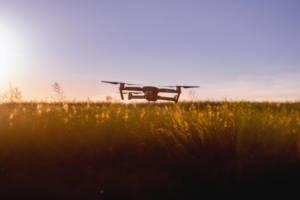 Precision Farming: Utilizing data-driven insights for precise resource management.
Precision Farming: Utilizing data-driven insights for precise resource management.
Smart Agriculture: Application of IoT, sensors, drones, and data analytics to enhance productivity and efficiency.
Agrochemicals: Optimizing the use of fertilizers and pesticides.
Indoor Farming: Technologies specific to controlled environment agriculture.
Biotechnology: Genetic engineering and other biological interventions to improve crop traits.
Irrigation: Precision mobile irrigation systems that can save 30% to 50% of water use compared to traditional methods.
The following are among the sectors of the agricultural technology industry:
 Big Data and Analytics: This segment involves collecting, organizing, and analyzing vast amounts of agricultural data to uncover valuable insights and make informed decisions.
Big Data and Analytics: This segment involves collecting, organizing, and analyzing vast amounts of agricultural data to uncover valuable insights and make informed decisions.
Biotechnology and Biochemicals: This includes the development and application of biological and chemical solutions to improve crop yields and resistance.
Mobility Solutions: Mobile technologies that enable farmers to access information and control farm operations remotely.
Sensors and Connected Devices: This segment includes IoT devices, drones, and satellite connectivity that gather critical farm data for precision agriculture.
Farm Management Software: Computer and mobile applications designed to improve operational efficiency, optimize input usage, and provide back-office solutions.
Precision Agriculture Hardware: Products that provide real-time measurements of soil fertility and moisture, enable auto-steer capabilities, and optimize planting and pesticide application.
Remote Sensing Technologies: Satellite and unmanned aerial vehicle solutions that monitor crop growth and identify stressors.
Farm Robotics and Automation: Advanced field machinery designed to reduce labor needs, optimize field operations, and increase productivity.
Robotics perform many functions in agriculture, such as:
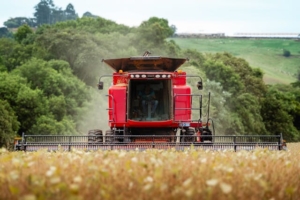 Planting and Seeding: Robotic systems are employed for precise planting and seeding operations. Autonomous tractors and specialized robots use GPS technology and advanced sensors to plant seeds at optimal depths and intervals,.
Planting and Seeding: Robotic systems are employed for precise planting and seeding operations. Autonomous tractors and specialized robots use GPS technology and advanced sensors to plant seeds at optimal depths and intervals,.
Crop Monitoring: Agricultural drones and ground-based robots equipped with advanced sensors and cameras traverse fields to collect data on crop health, soil conditions, and pest infestations.
Weeding and Pest Control: Robots use image recognition technology to identify and remove weeds without damaging nearby crops. Some systems apply herbicides or pesticides with precision, reducing chemical usage and environmental impact.
Harvesting: Harvesting robots are designed to pick fruits and vegetables at peak ripeness. These machines use sensors and cameras to detect when crops are ready for harvesting and employ robotic arms to carefully pick produce without causing damage.
Irrigation: Robotic systems analyze soil moisture levels and weather data to optimize irrigation, ensuring crops receive the right amount of water at the right time.
Fertilization: Precision agriculture robots apply fertilizers in targeted amounts based on soil analysis and crop needs, reducing waste and improving nutrient management.
Livestock Management: Robots are also used in livestock farming for tasks such as automated milking systems for dairy farms and feed distribution as well as monitoring animal health and behavior.
Artificial intelligence is used to render agriculture management more efficient. The following are examples of such:
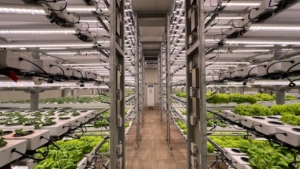 Crop Management: Machine learning algorithms process data from sensors, satellite imagery, and crop growth models to provide valuable insights into soil conditions, moisture levels, and crop ripeness.
Crop Management: Machine learning algorithms process data from sensors, satellite imagery, and crop growth models to provide valuable insights into soil conditions, moisture levels, and crop ripeness.
Smart Irrigation: AI-powered systems monitor soil moisture levels and weather patterns to optimize water usage, reducing waste and improving plant health.
Variable Rate Technology: AI helps apply fertilizers, pesticides, and water precisely where needed, based on real-time sensor data and GPS information. This targeted approach ensures optimal resource use and minimizes waste.
Risk Management: Predictive analytics reduces errors in farming processes and helps identify potential risks associated with pests, diseases, and adverse weather conditions.
Regenerative Agriculture: AI assists farmers in adopting practices like reduced tillage, cover cropping, and nutrient management by analyzing their impact on soil carbon and financial profitability.
A lot of money is moving around in the agricultural technology industry. In Q3 2024, AgTech venture capital activity reached a significant milestone, with two consecutive quarters of increased deal values signaling a recovery from the lows of early 2024. The quarter saw $1.6 billion invested across 159 deals, representing a 15% increase in deal value compared to Q2. Some of the AgTech companies that received raised capital include: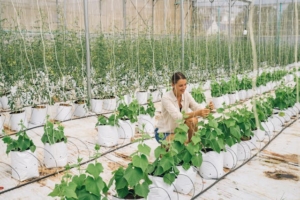
- Elo Life Systems raised $20.5 million in a Series A2 round led by DCVC Bio and Novo Holdings.
- Infinite Roots secured €58 million (approximately $63 million) in a Series B funding round.
- Bluewhite raised $39 million in Series C funding led by Insight Partners
- Neatleaf obtained $4 million in funding led by AgFunder
- DeHaat raised $100 million in funding from various investors.
- The Crop Project received a $1.51 million grant.
- Sistema.bio secured $15 million in a Series A round.
- Better Origin raised $16 million in a Series A round.
Below are some of the recent acquisitions of agricultural technologycompanies:
- TELUS Agriculture & Consumer Goods acquired Proagrica in March 2024, a major competitor in compliance and farm management software.
- FarmQA acquired Farm Dog in November 2024, expanding its digital agronomy platform and increasing its managed acreage from 2.7 million to over 30 million acres.
- Kubota North America Corporation acquired Bloomfield Robotics, a U.S. startup specializing in specialty crop monitoring services using image analysis and AI technology, in September 2024.
Lindsay Corporation announced plans to acquire a 49.9% stake in Pessl Instruments GmbH in April 2024.
Each management team will discuss their company’s existing and forthcoming product offerings. They will apprise listeners of their addressable markets and expectations for customer segments served. They will inform us of their research and development efforts, proprietary technologies and patent portfolios. They will tell us about their business models including the extent of their collaborations, licensing strategies, distribution channels, expansion efforts, manufacturing strategies, milestones and exit strategies.
Note: All Times Pacific
09:45 am – Welcoming Remarks
Speaker: David Wanetick, CEO, Davos in the Desert
10:15 am – A Dealmaker’s Insights Into the Future of AgTech
Which kinds of technologies are needed to reduce labor shortages on farms? How successful will AI be in optimizing molecular structures of plants? How can farms profit from the carbon offset market? What kinds of fintech solutions will help farmers grow, insure and deliver their products to the markets? What is the future of hyperaccumulating plants and phytomining? Which sources of capital (venture capital funds, private equity, family offices, sovereign wealth funds) are most in sync with funding agtech?
Speaker: Mark Brooks, Venture Investor, Former Managing director at FMC Ventures & Investment Manager at Syngenta Ventures
11:00 am – Ventor Capitalists’ Perspective on Agricultural Technology
Which technologies are venture capitalists embracing to mitigate tight labor markets? What lessons should agtech investors learn from the cultured meat blow-out? How will potential Trump tariffs impact the agricultural market? How are proliferating animal diseases destroying the availability of farm products such as eggs? Which technologies can mitigate such risks? What are some of the signals that various biologics will be the winners? Or losers? Which regulations are likely to be most transformative for the agtech industry? What are some of the red flags that investors should be aware of when considering agtech investments?
Moderator: Tony Simpson, President & Founder, AgTech Advisors
Panelists: Harry Briggs, Partner, Astanor Ventures
Kevin Locket, Founding Partner, Fulcrum Global Capital
11:45 am – China’s Infiltration into Agricultural IoT
To what extent has China embedded IoT technologies into agricultural systems in the developing world? What kind of data sharing arrangements exist between farms around the world and Chinese agtech companies? How many Chinese surveillance cameras and biometric systems are placed on agribusinesses around the world? How can China’s intimate knowledge of food systems enable Beijing to destabilize countries?
Speaker: David Wanetick, CEO, Davos in the Desert
Please check back for the agenda of presenting companies. If you would like to nominate a company to present, please contact Gustavo Yrepa at gustavo@davosinthedesert.us.
Register now to listen to presentations from industry leaders and innovators. Registration is free for members of Davos in the Desert. Non-members can register now for just $10. No refunds.
Secure your spot today and be part of shaping the future of Agricultural Technology!
